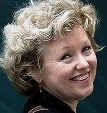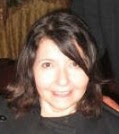

By Caitlin Rother
Naked Addiction began as what we call in fiction-writing workshops “a germ.” It became one of a series of diary entries of my murder victim, which grew into a short story, which grew into a novel. At the time, I was working as a news reporter, writing as many as four stories a day. I needed a creative outlet, and I found it in fiction.
It took me 17 years of writing, rewriting, trying to find an agent, and then a publisher, to get this baby published. And although I could spend this entire blog telling you about those 17 years, I'm not going to do that. I'm only going to focus on the last five years, which will bring home my point: the keys to becoming a published author – and staying a published author – are persistence, determination, and the ability to rebound from rejection.
Fiction has always been my passion and it has helped me bring my narrative nonfiction thrillers alive. That’s good, because that’s what pays my bills. I can't tell you how excited I was when Naked Addiction first got accepted by Dorchester Publishing. I'd hoped to get a bigger publisher that would release my book as a hardcover, but after so many years of rejection, this was a victory and it felt good to proudly display this blurb from best-selling novelist Michael Connelly on the cover: “With a journalist's eye for telling the details of life, Caitlin Rother is a keen architect of the most important part of storytelling: character. The people in her prose grip you tightly with their truth.”
Well, the book didn’t sell all that well, because no one promoted it. Not the publisher and not me, because I didn't know any better at the time, and I was also working on back-to-back true crime books, on deadline, without a day in between to spare. My first book, Poisoned Love, had sold so well that Barnes & Noble ordered 10 copies of the new novel for every store, and when they didn't sell after only two or three months on the shelf – yes, this is typical for a paperback, thus the term “shelf life” – many of those books were returned. For those of you, when a book is “stripped,” the cover is ripped off and sent back to the publisher; the book goes into the trash. My royalty statement literally broke my heart.
Over the next couple of years Borders and Barnes & Noble stopped carrying it, and customers couldn’t order it from either chain. The frustrating thing was that the book was still in print, but no one could buy it unless they knew to get it off the publisher's website. Or, sadly, on Amazon for 99 cents, and later, only one cent. (I later learned that Barnesandnoble.com was still selling it closer to the cover price, but not till much later.)
Still, I could not let go, not after all these years and all that work. A million calls and e-mails later to distributors, Barnes & Noble, my agent and publisher, I urged my agent to try to get my rights back or ask Dorchester to re-release the book now that I was doing so well with all my non-fiction books. (Including this one, I would have six books out in 18 months.)
After lobbying for about a year, we finally persuaded Dorchester – which had been going through serious financial woes, continuing to sell books for which they no longer owned the rights, and generally angering so many authors that they launched a boycott – to do a re-release.
With a new editor and management team in place, my agent and I were promised that this was a new Dorchester, and they wanted to do right by my book. Naked Addiction would be part of their new trade paperback line and it would also come out as an e-book, with a higher and more acceptable royalty percentage.
I was thrilled. We set the release date of January 3, 2012, a month after the re-release of Poisoned Love, an updated edition with 20 new pages. This was a carefully choreographed move so the books would complement each other, and so I could promote them simultaneously.
I spent more money than I could afford on a combined web and radio tour and a revamp of my website. Along the way, I was thrilled that one of my books landed on the New York Times bestseller list, a first for me. And after having persuaded Dorchester to design a new cover for Naked Addiction, I was excited that they were able to redo it once again to include the bestseller mention. Things were looking bright. My radio tour went great, and my Web tour went off without a hitch.
The first sign that something was wrong came in December 2011. The bookstores where I had arranged signings couldn’t get advanced copies as Dorchester had promised, and even if they could the books were non-returnable, which meant that the bookstores wouldn’t carry them anyway.
Next, the VP of sales left the company, and without my knowledge, so did the president. I managed to guilt Dorchester into sending me a box of advanced copies without charging me for shipping (I still had to purchase the books), so the bookstores had something to sell, with the promise that the stores would replace my personal stock once the book came out – all so that readers could give the books as Christmas gifts.
Then, I got an e-mail from a friend saying that his pre-ordered copy from Amazon
wasn't going to be delivered in till March. March? How could that be? No one at the publisher would answer my e-mails except one very sweet woman in sales, who was doing everything she could to help me, but even she couldn't tell me what was going on – only that the January 3 release date might not happen.
January 3 came and went, the book was not released, and I still couldn't get anyone to respond to my e-mails, including the editor, who had seemed genuinely sincere in his previous efforts to do right by my book. The release date on Amazon now said March 1. It was perplexing and frustrating, and my promotions plan was losing traction by the minute. I put the pre-paid web tour on hold until we could get a new, firm release date.
Dorchester’s publicist said the editor was trying to deal with this and would get back to me – I had heard that this had something to do with ongoing negotiations with the distributor about the “no-return” policy – but she had also stopped reassuring me that the book would come out as planned.
Then the release date on the Dorchester website changed to a retroactive December 15, 2011, and the trade version of the book disappeared altogether. This was bad. I was watching my book release dissipate like tiny tufts of clouds in a strong wind. And there was nothing I could do about it.
I was right back where I was, only worse, because I had lost the benefit of the thousands of dollars I’d spent on publicity, plus an entire year’s worth of potential royalties, because I could have published the book myself as an e-book last year.
Then the sweet lady in sales was let go. The editor left a few weeks later, followed by the publicist. “They're moving offices,” I was told by someone who had been laid off, which apparently was code for “we’re going out of business and shutting our doors,” because my agent hasn't been able to get anyone on the phone since.
A few days ago, I found a blog saying that Dorchester had been acting as if it were in bankruptcy for the past year, trying to squeeze out every last cent by selling off assets (they apparently still owe hundreds of thousands of dollars to authors and booksellers), and that the goal was to liquidate everything, including book rights, before really filing for bankruptcy.
I fired off an e-mail to my agent, strongly suggesting that we immediately ask for my rights back, and enclosed the address for the registered agent for the corporation, given that the corporate headquarters had terminated its entire staff and was likely closed, before my book was "liquidated."
After much anguish, I've finally decided to go ahead with the prepaid Web tour because I do still have a couple boxes of books in my closet that I can sell myself. The e-book is still available on Amazon and B&N.com, and while I'll probably never see the royalties, maybe this will help draw some new readers to my other books. Only now I can't get the Web tour publicist to respond to my e-mails either.
But I'll keep trying. After all, the book was written for people to read. Getting paid for it would be nice, but at this point, I’m already gearing up for book #8 to come out in July (Lost Girls), and trying to focus on the accomplishment that the updated version of Poisoned Love went to another printing within a week of its release. I've finished a spin-off to Naked Addiction, which is in my agent's hands now, and I'm already working on my next narrative nonfiction thriller, and another book or two after that.
These days, my mantra is this: I'm a storyteller, I love what I do – sometimes more than other times – and no one can take that away from me.
Onward.
Oh, and let me know if you’d like to buy a signed copy. (crother@flash.net)














